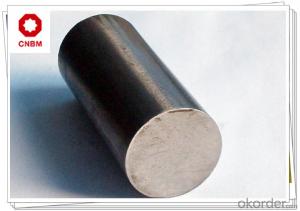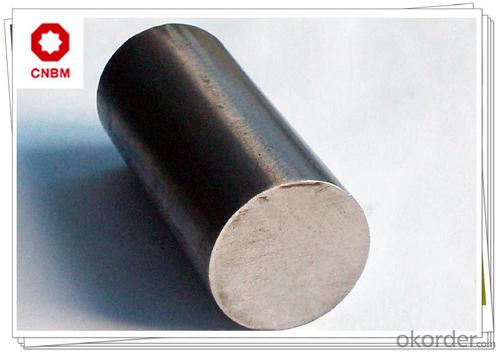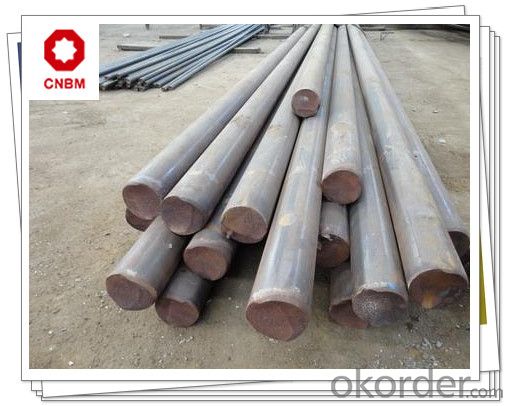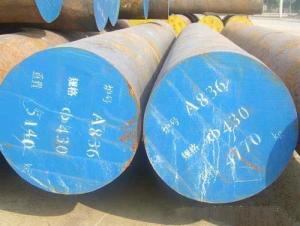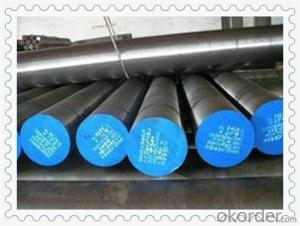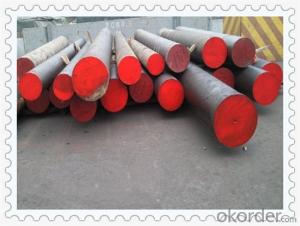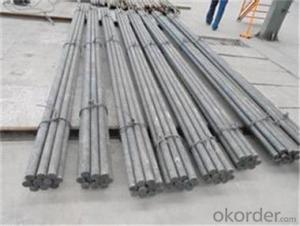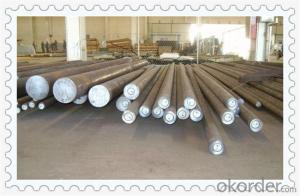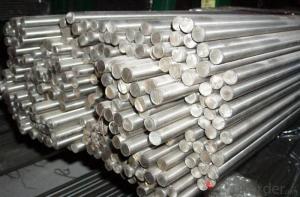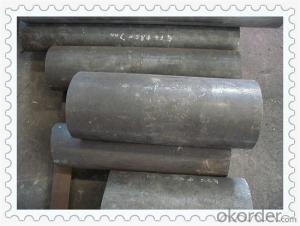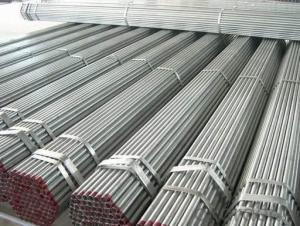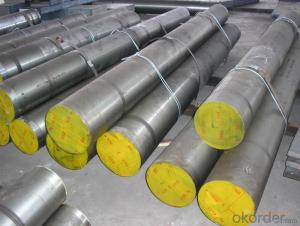AISI 5140 Alloy Steel Round Bars
- Loading Port:
- Shanghai
- Payment Terms:
- TT OR LC
- Min Order Qty:
- 30 m.t.
- Supply Capability:
- 120000 m.t./month
OKorder Service Pledge
OKorder Financial Service
You Might Also Like
ASTM 5140 Alloy Steel Round Bar
Specification
Chemical Composition | Mechanical Properties (In Quenched & Tempered State) | ||
C | 0.37-0.44 % | Tensile strength(MPA) | ≥980(100) |
Si | 0.17-0.37 % | Yield strength (MPA) | ≥785(80) |
Mn | 0.50-0.80 % | Elongation (δ5/%) | ≥9 |
Cr | 0.80-1.10 % | Reduction in Area (ψ/%) | ≥45 |
Ni | ≤0.30 % | Impact (J) | ≥ 47 |
P | ≤0.035 % | Impact toughness value αkv (J/cm2) | ≥59(6) |
S | ≤0.035 % | Hardness | ≤207HB |
Cu | ≤0.030 % | ||
Detailed Information
1, Standard: GB, ASTM, AISI, SAE, DIN, JIS, EN
2, Produce Process: smelt iron - EAF smelt billet - ESR smelt billet -
hot rolled or forged to get the steel round bar and plate
3, Heat Treatment: annealing, normalizing, tempering, quenching
4, Surface Treatment: Black, Polished, Galvanized
5, Quality Assurance: We accept third party inspection for all orders.
You can ask testing organizations such as SGS, BV, etc. to test our products before shipping.
Products Show
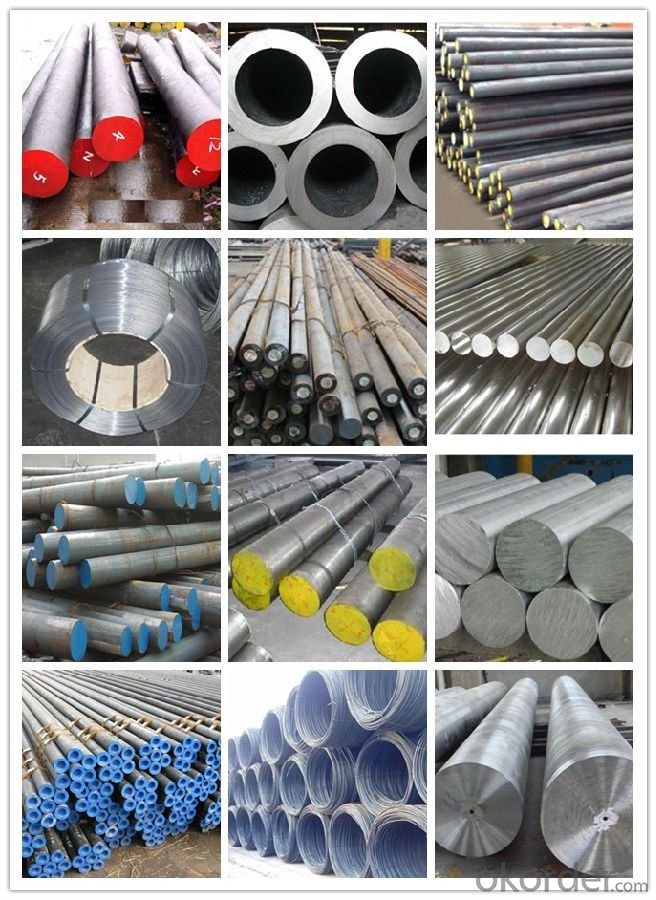
Product Overviews
Product Name | Typical Grades | Diameter(mm) | Standard adopted |
Carbon Steel | 20 (1020/S20C/C22) |
Ø16-Ø300 |
GB/SAE/JIS/DIN |
40 (1040/S40C/C40) | |||
45 (1045/S45C/C45) | |||
Bearing Steel | GCr9 (51100/SUJ1) |
Ø12-Ø250 | |
GCr15 (52100/SUJ2/100Gr6) | |||
GCr9SiMn (A485-Gr.1/SUJ3) | |||
Cr-Mo Steel | 20Cr (5120/SCr420H/20Cr4) |
Ø12-Ø250 | |
40Cr (5140/SCr440/41Cr4) | |||
42CrMo(4140/SCM440/42CrMo4) | |||
Gear Steel | 20CrNiMo |
Ø16-Ø600 | |
20CrMn(5115/SMnC420/20MnCr5) | |||
20CrNiMo(8620/SNCM220/20CrMiMo2) |
Application
| Carbon Steel | Mold bottom, Plastic mold, Construction machinery parts Automobile parts, Security grills, Screens, Construction |
| Bearing Steel | Aerospace, Navigation, Nuclear energy, Chemical industry Electronic information, Petrochemical, Instrument and meter Transportation |
| Cr-Mo Steel | Mechanism & Fasteners gear, Stressed components for vehicles Engines and machines, Parts of larger cross-section |
| Gear Steel | All kinds of gears, Statically and dynamically stressed component for vehicles Engines and machine, Larger cross-section parts, Crankshafts |
Work Shop

Company Information
CNBM International Corporation is the most important trading platform of CNBM group.
Whith its advantages, CNBM International are mainly concentrate on Cement, Glass, Iron and Steel, Ceramics industries and devotes herself for supplying high qulity series of refractories as well as technical consultancies and logistics solutions.


FAQ
1, Your advantages?
professional products inquiry, products knowledge train (for agents), smooth goods delivery, excellent customer solution proposale
2, Test & Certificate?
SGS test is available, customer inspection before shipping is welcome, third party inspection is no problem
3, Factory or Trading Company?
CNBM is a trading company but we have so many protocol factories and CNBM works as a trading department of these factories. Also CNBM is the holding company of many factories.
4, Payment Terms?
30% TT as deposit and 70% before delivery.
Irrevocable L/C at sight.
5, Trading Terms?
EXW, FOB, CIF, FFR, CNF
6, After-sale Service?
CNBM provides the services and support you need for every step of our cooperation. We're the business partner you can trust.
For any problem, please kindly contact us at any your convenient time.
We'll reply you in our first priority within 24 hours.
Packaging & Delivery
1, Packaging: seaworthy package or as required
2, Delivery: 35-45 days or based on quantity

- Q: What is the difference between a bright and a rough turned steel round bar?
- The primary differences between a bright turned steel round bar and a rough turned steel round bar lie in their surface finishes and the precision involved in their manufacturing processes. A bright turned steel round bar boasts a sleek and shiny surface finish. This is achieved by subjecting the bar to supplementary processes such as polishing or grinding after the initial turning operation. The bright surface finish not only enhances the bar's aesthetic appeal but also provides improved resistance against corrosion. Conversely, a rough turned steel round bar exhibits a more textured surface finish. It is typically obtained directly from the turning operation without any additional refining processes. The rough surface finish may display visible tool marks and a slightly uneven texture. Regarding manufacturing precision, a bright turned steel round bar tends to be more accurate and precise in terms of its dimensions and tolerances. The additional processes involved in attaining a bright surface finish also enable tighter control over the bar's specifications. As a result, bright turned bars are suitable for applications where precise dimensions and tolerances are crucial. In contrast, a rough turned steel round bar may have slightly looser tolerances due to the nature of the turning process and the absence of further refining operations. Nevertheless, rough turned bars can still meet the requirements of many applications that do not necessitate high precision. Ultimately, the choice between a bright turned steel round bar and a rough turned steel round bar hinges on the specific application and the desired surface finish and precision.
- Q: Can steel round bars be used for making suspension components?
- Yes, steel round bars can be used for making suspension components. Steel round bars are often utilized in the manufacturing of suspension components due to their excellent strength, durability, and resistance to fatigue. They provide the necessary support and stability required for suspension systems to function effectively.
- Q: What are the typical yield strengths of different grades of steel round bars?
- The yield strength of steel round bars can vary depending on the specific grade of steel. Here are some typical yield strengths for different grades of steel round bars: - Mild steel round bars typically have a yield strength of around 250 MPa (megapascals) or 36,000 psi (pounds per square inch). - Carbon steel round bars can have a yield strength ranging from 350 to 550 MPa or 50,000 to 80,000 psi. - Alloy steel round bars, such as 4140 or 4340, generally have higher yield strengths compared to mild or carbon steel. The yield strength of these alloys can range from 550 to 850 MPa or 80,000 to 120,000 psi. - Stainless steel round bars come in various grades, and their yield strengths can vary accordingly. For example, austenitic stainless steels like 304 or 316 typically have yield strengths ranging from 200 to 300 MPa or 29,000 to 43,000 psi. On the other hand, duplex stainless steels like 2205 or 2507 can have higher yield strengths ranging from 450 to 650 MPa or 65,000 to 95,000 psi. It is important to note that these values are just typical ranges, and the actual yield strength of a specific grade of steel round bar may differ based on factors such as heat treatment, manufacturing process, and other variables. Therefore, it is always recommended to consult the manufacturer's specifications or industry standards for accurate and precise yield strength values of steel round bars.
- Q: Can steel round bars be used for making gates?
- Yes, steel round bars can be used for making gates. Steel round bars are a popular choice for making gates due to their strength, durability, and versatility. They can be easily welded together to create the desired gate design and can withstand heavy loads and impacts. Additionally, steel round bars can be galvanized or coated to protect against rust and corrosion, ensuring the longevity of the gate. Overall, steel round bars are a suitable material for gate construction and are commonly used in residential, commercial, and industrial applications.
- Q: Can steel round bars be used for making heat exchangers?
- Yes, steel round bars can be used for making heat exchangers. Steel is a commonly used material in heat exchangers due to its excellent thermal conductivity, high strength, and resistance to corrosion. Steel round bars can be easily machined and shaped to meet the specific requirements of a heat exchanger design. Additionally, steel is readily available and cost-effective, making it a popular choice for manufacturing heat exchangers in various industries. However, it is important to consider the specific application and operating conditions of the heat exchanger to ensure that the chosen steel grade is compatible and can withstand the required temperature and pressure.
- Q: What is the difference between a polished and a precision ground steel round bar?
- A polished steel round bar refers to a bar that has undergone a polishing process to achieve a smooth and shiny surface finish. This process involves using abrasive materials to remove any imperfections or roughness on the surface of the bar. The end result is a visually appealing bar with a high level of aesthetic appeal. On the other hand, a precision ground steel round bar is a bar that has been precisely ground to achieve tight dimensional tolerances and a smooth surface finish. This grinding process involves removing material from the surface of the bar using grinding wheels or other cutting tools. The purpose of precision grinding is to ensure that the bar meets specific size and shape requirements, making it suitable for use in applications that demand precise dimensions and tight tolerances. In summary, the main difference between a polished and a precision ground steel round bar lies in the purpose of the respective finishing processes. Polishing is primarily done for aesthetic reasons, enhancing the appearance of the bar, while precision grinding focuses on achieving precise dimensions and tight tolerances to meet specific technical requirements.
- Q: How do steel round bars compare to other types of steel products?
- Steel round bars have several advantages over other types of steel products. Firstly, their cylindrical shape makes them highly versatile and easy to work with, allowing for various applications in construction, manufacturing, and engineering. Secondly, round bars have superior strength and durability, making them ideal for load-bearing structures and heavy-duty machinery. Additionally, their uniformity and smooth surface facilitate precision machining and fabrication processes. Lastly, steel round bars offer excellent resistance to corrosion and wear, ensuring a longer lifespan compared to other steel products. Overall, their unique properties and versatility make steel round bars a preferred choice for many industries.
- Q: What are the different types of steel round bars used in the manufacturing of bearings?
- There are several different types of steel round bars used in the manufacturing of bearings. The specific type of steel used will depend on various factors, such as the application, load capacity, and desired performance characteristics of the bearing. One commonly used type of steel for manufacturing bearings is through-hardened steel. This type of steel is heat-treated to achieve a uniform hardness throughout the entire bar. Through-hardened steel round bars provide excellent strength and wear resistance, making them suitable for high-load bearing applications. Another type of steel that is frequently used in bearing manufacturing is case-hardened steel. This steel is hardened only on the surface, while the core remains relatively soft. Case-hardened steel round bars offer a combination of high surface hardness for wear resistance and a softer core for improved toughness and impact resistance. Stainless steel is also utilized in the production of bearings, particularly in applications that require corrosion resistance or operate in harsh environments. Stainless steel round bars have excellent resistance to rust and corrosion, making them ideal for use in marine or chemical industries. Furthermore, alloy steel round bars are commonly employed in bearing manufacturing. These steels are made by adding various alloying elements, such as chromium, molybdenum, or nickel, to enhance specific properties like hardness, toughness, or heat resistance. Alloy steel round bars are often used in specialized bearing applications that require exceptional performance under high temperatures or extreme conditions. In summary, the different types of steel round bars used in bearing manufacturing include through-hardened steel, case-hardened steel, stainless steel, and alloy steel. Each type offers unique properties and characteristics that make them suitable for specific bearing applications.
- Q: Can steel round bars be used in the manufacturing of household appliances?
- Household appliances can indeed make use of steel round bars. Steel, being a versatile and durable material, is widely employed in a variety of industries, including the manufacturing of appliances for homes. The construction of appliance frames, support structures, and even internal components can all benefit from the utilization of steel round bars. Its high strength and resistance to corrosion make steel an excellent choice for ensuring the longevity and durability of household appliances. Moreover, steel can be easily molded and shaped to precise dimensions, allowing for the creation of appliances with intricate designs. In summary, incorporating steel round bars into the manufacturing process of household appliances helps to produce products that are of superior quality, reliability, and longevity.
- Q: What is the difference between a rough turned and a precision ground steel round bar?
- A rough turned steel round bar is a raw material that has undergone minimal machining, leaving a slightly rough surface finish. It is typically used for applications where a high level of precision is not required, such as structural components. On the other hand, a precision ground steel round bar is a finished product that has undergone precise machining to achieve a smooth and accurate surface finish. This process ensures tight dimensional tolerances and a consistent diameter throughout the length of the bar. Precision ground bars are commonly used in applications that require close dimensional control and a high level of accuracy, such as in machinery and tooling.
Send your message to us
AISI 5140 Alloy Steel Round Bars
- Loading Port:
- Shanghai
- Payment Terms:
- TT OR LC
- Min Order Qty:
- 30 m.t.
- Supply Capability:
- 120000 m.t./month
OKorder Service Pledge
OKorder Financial Service
Similar products
Hot products
Hot Searches
Related keywords


